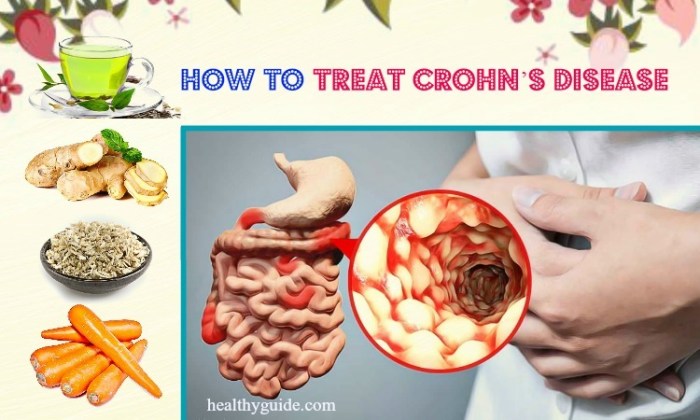
Starting off with Top 5 Natural Remedies That Help Manage Crohn’s Disease, this opening paragraph aims to capture the readers’ attention and provide a brief overview of the topic in a captivating manner.
The following paragraph will delve deeper into the details and intricacies of the subject at hand.
Overview of Crohn’s Disease

Crohn’s disease is a chronic inflammatory condition that affects the gastrointestinal tract, causing symptoms such as abdominal pain, diarrhea, fatigue, weight loss, and malnutrition. This autoimmune disorder can impact a person’s daily life by causing frequent flare-ups, unpredictable bowel movements, and the need for medication management.
Impact of Crohn’s Disease on Daily Life
Crohn’s disease can significantly impact a person’s quality of life by causing physical discomfort, emotional stress, and limitations in daily activities. The symptoms of the disease can vary in severity and frequency, leading to challenges in maintaining a regular routine and participating in social events.
Managing Crohn’s disease often requires dietary restrictions, medication adherence, and regular medical monitoring to prevent complications.
Prevalence of Crohn’s Disease
According to the Crohn’s & Colitis Foundation, an estimated 3 million adults in the United States are living with inflammatory bowel disease (IBD), including Crohn’s disease. Globally, the prevalence of Crohn’s disease has been increasing over the years, with a higher incidence in developed countries.
It is essential for individuals with Crohn’s disease to work closely with healthcare providers to develop a personalized treatment plan and improve their overall quality of life.
Importance of Natural Remedies
When it comes to managing Crohn’s disease, natural remedies play a crucial role in providing relief and improving overall well-being. These remedies offer a holistic approach to treatment, focusing on the root causes of the disease rather than just alleviating symptoms.
Benefits of Natural Remedies
- Natural remedies are gentle on the body and less likely to cause harmful side effects compared to conventional medications.
- Many natural remedies have anti-inflammatory properties, which can help reduce inflammation in the digestive tract, a common symptom of Crohn’s disease.
- Some natural remedies, such as probiotics and herbal supplements, can help restore the balance of gut bacteria, which is often disrupted in individuals with Crohn’s disease.
Comparison with Conventional Treatments
- Conventional treatments for Crohn’s disease often involve medications such as corticosteroids and immunosuppressants, which can have serious side effects including weight gain, osteoporosis, and increased risk of infections.
- In contrast, natural remedies focus on promoting overall health and strengthening the immune system, without the risk of harmful side effects associated with some conventional medications.
Potential Side Effects of Traditional Medications
- Traditional medications for Crohn’s disease may lead to long-term complications such as liver damage, kidney problems, and increased risk of certain cancers.
- Some medications used to treat Crohn’s disease can weaken the immune system, leaving individuals more susceptible to infections and other illnesses.
Top 5 Natural Remedies for Managing Crohn’s Disease
Managing Crohn’s disease can be challenging, but there are natural remedies that can help alleviate symptoms and improve quality of life. Here are the top 5 natural remedies that have been found to be effective:
1. Probiotics
Probiotics are beneficial bacteria that can help restore the balance of gut flora in individuals with Crohn’s disease. They work by promoting healthy digestion, reducing inflammation, and strengthening the immune system. Many people with Crohn’s disease have reported reduced symptoms and flare-ups after incorporating probiotics into their daily routine.
2. Turmeric
Turmeric is a spice known for its anti-inflammatory properties, thanks to the active compound curcumin. It can help reduce inflammation in the digestive tract, easing symptoms such as abdominal pain and diarrhea. Some individuals have experienced significant improvement in their Crohn’s disease symptoms by adding turmeric to their diet or taking supplements.
3. Aloe Vera
Aloe vera has soothing properties that can help reduce inflammation and promote healing in the digestive tract. It is often used to alleviate symptoms such as stomach pain, cramping, and diarrhea in individuals with Crohn’s disease. Incorporating aloe vera juice or gel into your daily routine may help manage symptoms and improve overall gut health.
4. Fish Oil
Omega-3 fatty acids found in fish oil have anti-inflammatory properties that can benefit individuals with Crohn’s disease. By reducing inflammation in the body, fish oil supplements can help alleviate symptoms such as joint pain, fatigue, and inflammation in the gut.
Many individuals with Crohn’s disease have reported a decrease in symptoms after incorporating fish oil into their treatment plan.
5. Slippery Elm
Slippery elm is an herb known for its mucilage content, which forms a protective layer along the digestive tract, soothing inflammation and irritation. It can help alleviate symptoms such as diarrhea, cramping, and heartburn in individuals with Crohn’s disease. Some people have found relief from their symptoms by taking slippery elm supplements or drinking tea made from the herb.
Dietary Changes and Crohn’s Disease
In managing Crohn’s disease, dietary changes play a crucial role in alleviating symptoms and promoting overall gut health and reduced inflammation.
Foods to Include and Avoid
- Include: Foods rich in fiber such as fruits, vegetables, whole grains, and legumes can help regulate bowel movements and maintain gut health.
- Avoid: Dairy products, spicy foods, high-fat foods, and caffeine can trigger inflammation and worsen Crohn’s symptoms.
- Include: Probiotic-rich foods like yogurt and kefir can help restore healthy gut bacteria balance and reduce inflammation.
- Avoid: Processed foods, sugary snacks, and artificial sweeteners can aggravate digestive issues and inflammation in Crohn’s disease.
Impact of Dietary Changes on Gut Health
Dietary changes can significantly impact gut health by reducing inflammation, promoting healing of the intestinal lining, and maintaining a balanced microbiome. By incorporating nutrient-dense foods and avoiding triggers, individuals with Crohn’s disease can better manage their symptoms and improve their quality of life.
Lifestyle Modifications and Self-Care Practices
Managing Crohn’s disease involves more than just medication and natural remedies. Lifestyle modifications and self-care practices play a crucial role in improving the overall well-being of individuals with this condition.
Reducing Stress and Improving Sleep
Chronic stress can exacerbate symptoms of Crohn’s disease, leading to flare-ups and increased inflammation. It is essential to find effective ways to reduce stress, such as practicing mindfulness, deep breathing exercises, yoga, or meditation. Adequate sleep is also crucial for managing Crohn’s disease, as it helps the body heal and repair itself.
Establishing a regular sleep routine and creating a relaxing bedtime environment can improve sleep quality.
Benefits of Exercise and Physical Activity
Regular exercise can have numerous benefits for individuals with Crohn’s disease. Physical activity helps reduce inflammation, improve digestion, boost mood, and enhance overall well-being. Engaging in low-impact exercises like walking, swimming, or yoga can be beneficial. It is essential to consult with a healthcare provider before starting any exercise regimen to ensure it is safe and appropriate for your condition.
Closing Summary

Concluding with a summary that encapsulates the essence of the discussion, leaving the readers with a lasting impression.
Essential FAQs
What are some common symptoms of Crohn’s disease?
Common symptoms include abdominal pain, diarrhea, weight loss, and fatigue.
Are natural remedies safe to use for managing Crohn’s disease?
Natural remedies can be safe but it’s important to consult with a healthcare provider before trying them.
Can diet really impact Crohn’s disease symptoms?
Yes, diet plays a crucial role in managing Crohn’s disease symptoms and overall gut health.
How important are lifestyle modifications in managing Crohn’s disease?
Lifestyle modifications are key in managing Crohn’s disease as they can help reduce symptoms and improve quality of life.













